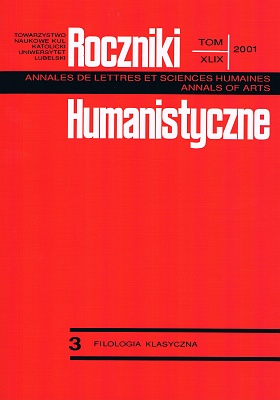Metodologia nowoczesnej rozprawy naukowej według Diogenesa z Apollonii
Abstrakt
Diogenes of Apollonia, a philosopher-eclectic of the second half of the fifth century BC, opens his treatise On Nature in a different way than pre-Socratics, proposing a novel methodological model in scientific research. This introduction is the subject matter of the paper, that is fragment B 1, in which there appears the concept of logos, a key word in Diogenes' methodology.
On the grounds of a semantic analysis one may say that fragment B 1 is a first attempt in the history of science at a formulation of methodological presumptions, such that are required of all research which are to be fixed in a written form of a scientific dissertation. Diogenes' proposal bears the signs of universal method, for it deals with any dissertation (λόγου παντός) and anyone who sets to edit it (ἀρχόμενον). In line with Diogenes' presuppositions, anyone who undertakes a scientific research should assume: 1) an indubitable assumption (= evident axiom − ἡ ἀρχὴ ἀναμφισβήτητος) on which his whole argumentation is based and to which it always returns (as his point of departure), and 2) one should speak seriously, i.e. to be as comprehensible as possible, responsible and in accord with the theme under discussion (ἡ ἑρμηνεία ἁπλῆ καὶ σεμνή).
Satisfying the above requirements, each scholar will achieve his desired goal and will accomplish a reliable dissertation with a true character of a scientific paper, his logos, having studied the assumed topic (τὸ ξύμπαν εἰπεῖν). One should bear in mind that its roots should be sought as early as Diogenes of Apollonia, who in the concept of „logos” combines closely and balances in proportion both the rational element (methodology) and the expressive one (under the form of the language of scientific work). Consequently, having such considerations based on clear and unquestioned methodological presuppositions, there appears a transparent and harmonious dissertation, put in proper words, an ancient ”prototype” of our contemporary scientific studies.
Bibliografia
Auerbach M.: Platon a matematyka grecka. „Kwartalnik Klasyczny” 6:1932 s. 45-56.
Barnes J.: The Presocratic Philosophers. London 1993.
Burnet J.: Early Greek Philosophy. London 19082.
Calogero G.: Storia della logica antica. Vol. 1: L'età arcaica. Bari 1967.
Diels H., Kranz W.: Die Fragmente der Vorsokratiker. Griechisch und deutsch von H. Diels, Aufl. hrsg. von W. Kranz. Bd. 1-2. Berlin 19568.
DiogenisLaertii Vitae philosophorum. Recognovit brevique adnotatione critica instruxit H. S. Long. Vol. 1-2. Oxford 1964.
Freeman K.: Ancilla to the Presocratic Philosophers. Oxford 19716.
Guthrie W. K. C.: A History of Greek Philosophy. Vol. 2. Cambridge 1993.
Jaeger W.: The Theology of the Early Greek Thinkers. Oxford 1947.
Kirk G. S., Raven J. E.: The Presocratic Philosophers. Cambridge 19602.
Krokiewicz A.: Zarys filozofii greckiej. Od Talesa do Platona. Warszawa 1971.
Laks A.: Diogène d'Apolonie. La dernière cosmologie présocratique. Édition, traduction, et commentaire des fragments et des témoignages. Lille 1983.
Reale G.: Historia filozofii starożytnej. T. 1: Od początków do Sokratesa. Przeł. E. I. Zieliński. Lublin 1993.
Theiler W.: Zur Geschichte der teleologischen Naturbetrachtung bis auf Aristoteles. Leipzig−Zürich 1925.
Copyright (c) 2001 Roczniki Humanistyczne

Utwór dostępny jest na licencji Creative Commons Uznanie autorstwa – Użycie niekomercyjne – Bez utworów zależnych 4.0 Międzynarodowe.





